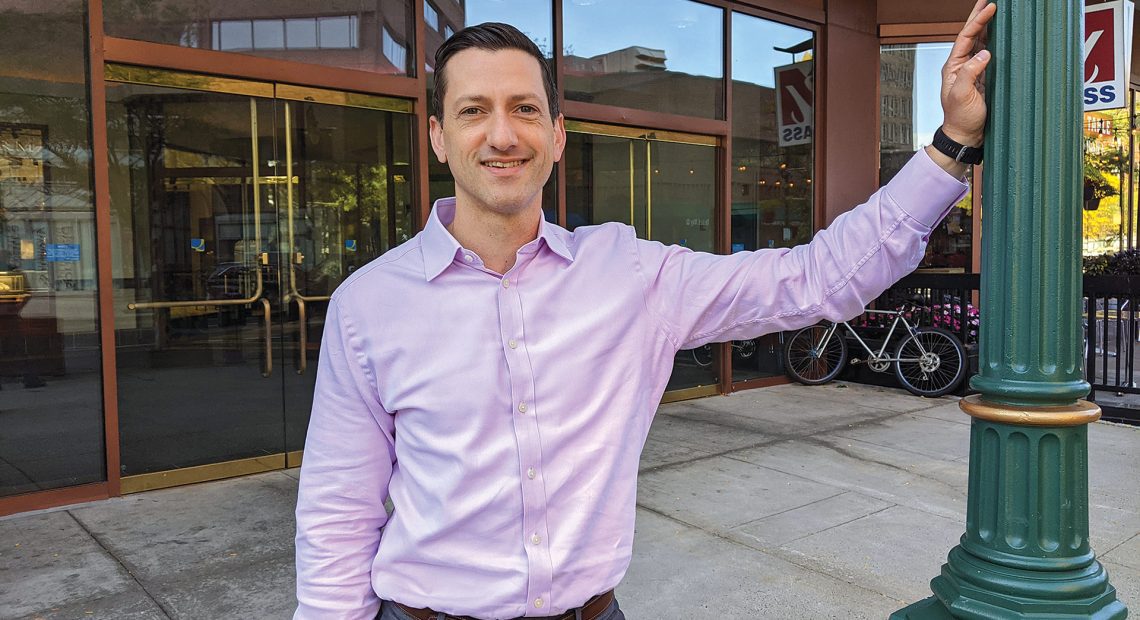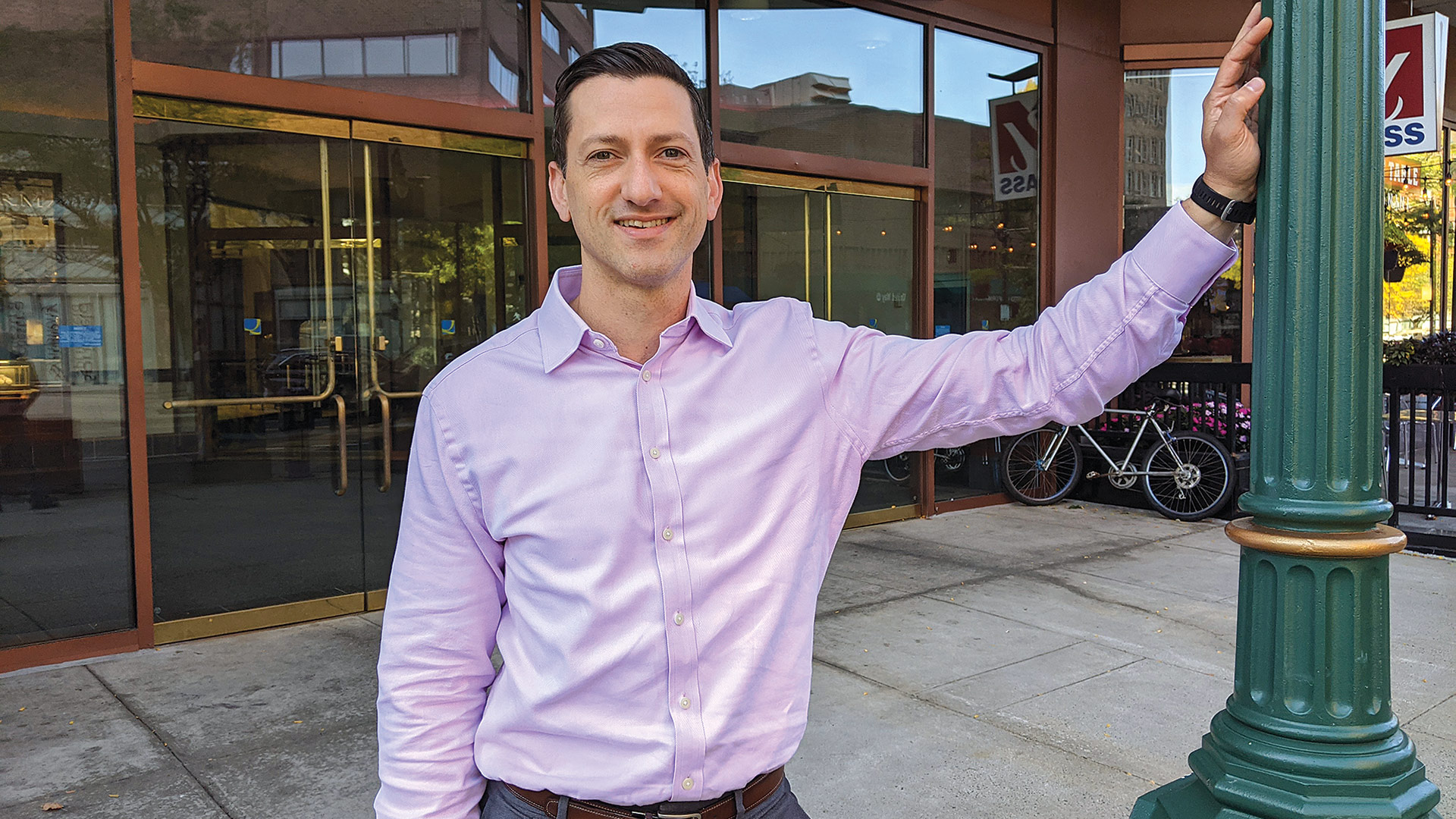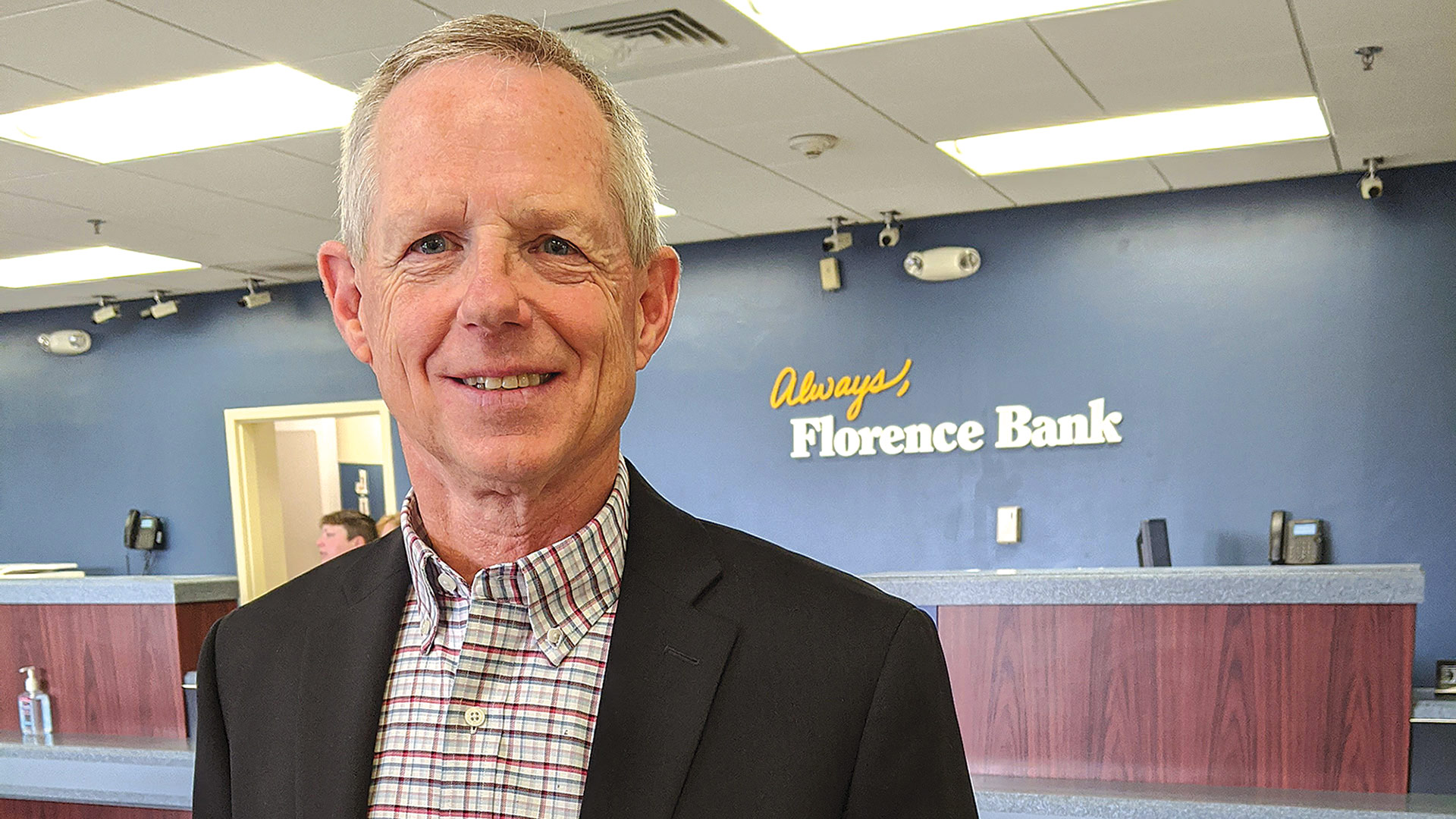
Banks See Healthy Surge of Commercial Lending
Open for Business

Ben Leonard outside Tower Square, where Country Bank just opened an office to service growing commercial business in and around Springfield.
Businesses didn’t stop borrowing in 2020, although much of last year’s lending activity had more to do with staying afloat with Paycheck Protection Program (PPP) loans than expanding operations. These days, with the economy in a more stable — if not exactly robust — place, many businesses are looking to invest and grow (that is, if they can get enough people to come to work), at a time when banks are sitting on more liquidity than usual and are anxious to lend it out.
When Country Bank announced it was opening a commercial-banking office in Springfield, Ben Leonard was intrigued by the opportunity, noting its similarities to the bank’s push into Worcester in recent years.
“Country Bank has been around a long time, but historically, the physical presence has been between Worcester and Springfield,” noted Leonard, a senior vice president who leads the new Springfield office, located downtown in Tower Square.
“But we’ve always served clients everywhere within a 100-mile radius, and we’ve seen more activity here,” he went on. “We have clients in Springfield and the greater area of Western Mass., so the impetus to build that office was to be closer to those customers. Part of that is growing our C&I [commercial and industrial lending] business — we see a growth market here. It’s an opportunity to grow.”
The C&I lenders who work in the Springfield office have experience in niches like manufacturing, distribution, and equipment-heavy companies, Leonard explained. “That’s kind of what the team knows, and that’s a big part of why Springfield and Worcester are appealing markets for the bank to expand in, because those kinds of businesses are what’s here.”
Those are also the kinds of businesses that maintained operations at a more or less steady level during the pandemic, and now they’re ready to grow — and borrow, he said, adding that the real-estate market is active as well.
Jeff Sullivan
“If there’s a hindrance to businesses growing, it’s labor. It’s not being able to buy the machine, it’s hiring someone to run the machine.”
“Certainly there’s a need for affordable housing, and we’re seeing a lot of turnover in real-estate properties, some repurposing, and some interesting dynamics with real-estate valuations being as high as they are. We’re also seeing situations where the dynamics have changed, where an office building is half-empty now, and it needs to change hands.”
In short, commercial lenders are busy, which marks a change from a year ago. More accurately, they were just as busy last year, but often dealing with some very pandemic-specific activities, from PPP loan processing to commercial-loan deferments, particularly for hard-hit industries like hospitality. These days, however, businesses (not all, but many) are moving past the treading-water stage and calling on banks to help them expand, not just survive.
“People are spending money,” said Jeff Sullivan, president of New Valley Bank, which is based in downtown Springfield, noting that some business owners are looking to buy property rather than continue to pay a landlord, while others are making speculative investments in real estate, rather than sitting on cash they may have accumulated during the pandemic, when spending was suppressed for both individuals and businesses.
“We’ll see two or three buddies get together and pool some money to use for a down payment on a two-family or three-family house, thinking, ‘I can make 10 to 15% on my money investing in real estate rather than have it make zero percent in my savings account,’” Sullivan said.
Many are first-time real-estate investors, he added, including young people and people of color aiming to build wealth, while established businesses are anxious to invest in their own operations.
“A lot of people have squirreled away cash from the government programs during the pandemic, and have been hanging onto that cash for a rainy day, and now they’re in a situation where they can use some of that — and banks are lending,” he said. “If there’s a hindrance to businesses growing, it’s labor. It’s not being able to buy the machine, it’s hiring someone to run the machine.”
Mike Lynch, senior lender at Florence Bank, said his institution is looking at commercial-loan numbers that are at least equal to pre-pandemic activity — and that’s on top of PPP loans.

Kevin Day says last year’s loan deferments were a “lifesaver” for many businesses.
“We do all kinds of loans, commercial real estate and C&I loans. We’ve seen strong activity across all sectors; it hasn’t been one pocket more than others,” Lynch said.
Florence Bank President Kevin Day agreed. “It’s kind of across the board — not every sector, necessarily; we’re not seeing many new hotels and restaurants opening up. But investment properties are creating new borrowers, and they need help with financing.”
The combination of low interest rates and high prices were driving the commercial-loan market a year ago, the last time BusinessWest tackled this story, and that has remained true. “In the real-estate market, everyone understands residential properties are hot,” Day said. “But in commercial real estate, it’s similar.”
Back to Normal?
One thing that has changed is the reliance on loan deferments, which was one of the leading stories in commercial lending (and retail lending as well, for mortgages, car loans, and credit cards) last year.
“We were very active in the deferment program. It was a lifesaver for a lot of businesses,” Day said. “As we’ve come into 2021, a lot of the deferment periods have ended, customers are emerging from pandemic lockdown activity, and things are becoming more normal.”
In the business world, “almost all commercial customers are out of deferments, back on normal schedules, and it feels like their business is gaining traction, getting back to to pre-pandemic levels,” he added. “In the hospitality areas — hotels, restaurants, and such — the pandemic hurt them, but even they’re coming back out of the malaise, and business is starting to pick up. The deferments gave people time, and as everything is starting to come back online, those businesses will get their customers back and should come out of it fine.”
Leonard said Country Bank handled close to 1,000 PPP loans totaling around $75 million.
“I’m happy to say we deployed a lot of that, and consulted with folks on the front end to be sure it wasn’t a rubber stamp,” he said. “It was a differentiator; I think the smaller banks really shined, and were nimble enough to support their customers. You can talk about being there for your customers when they need it, but could you deliver? I think Country Bank did.”
The bank is well-positioned to be a stable provider of financing going forward, he added, “because our capital ratios are head and shoulders above most other banks, which allows us to do a couple things. It means our lending limits are higher, but it also allows us to be patient and pragmatic with our customers.
“We have a lot of capital to lend and the ability to lend it, but where we’re going to be most successful is really understanding our businesses, so that we can bank them through cycles.”
“So I think we see an opportunity because of that,” he added. “We have a lot of capital to lend and the ability to lend it, but where we’re going to be most successful is really understanding our businesses, so that we can bank them through cycles. That is more important than ever, I think.”
Elaborating, Leonard said the pandemic reinforced the need for banks to have close relationships with their commercial clients and really understand their business, and to understand how much struggle — or success — over the past two years was a pandemic-induced anomaly and how much might remain the trend going forward.
“The value add for any banker, especially a C&I lender, is knowing a company well enough to make those educated decisions,” he told BusinessWest. “Our strategy is to spend a lot of time getting to know the companies we bank, so once we start a banking relationship, we’re in it, and we find a way to be pragmatic and support companies for the long term. That takes thoughtfulness on the front end.”
Sullivan said New Valley has been actively reaching out to small-business owners, who are often too busy running their business to seek help. “Larger companies have more resources and have banks calling on them all the time. There’s plenty of capital out there, and we want to make sure we connect with those business people, and that’s what we’re trying to do.”
Almost as one, bankers say there’s plenty of liquidity in the market, and once businesses began seeing some clarity with the pandemic — and, to be sure, there’s still plenty of uncertainty — they started moving into growth mode. But, again, the current labor situation is dampening some of that enthusiasm.
“I talk to a lot of business owners who are grateful the government bailed out businesses during the pandemic,” Sullivan said. “But there are some who would rather have a more normalized market where people are coming back to work.”
Meanwhile, “deposits are way up, and all the community banks I know are looking to put that money to work as loans rather than having it sitting around in cash. If anything, that’s become more exacerbated the last few weeks.”
Good Business
Like Country Bank, Florence Bank has expanded its geographic footprint in recent years, into Hampden County, specifically, to serve — and expand on — commercial business it was already doing in the region.
It has been a successful transition, Day said, one that has turned into retail business growth as well. But right now, he sees plenty of opportunity on the commercial side.
“Our credit quality, frankly, has never been better. People who had jobs and operated businesses during the pandemic have a lot of cash on hand. Hospitality businesses had to take time off because of the pandemic, but are now starting to get over it. Deferments helped people like that a great deal to come back online.”
The resulting liquidity in the system — and the resulting credit quality — mean delinquencies are at record lows, Day added. “Not only is business good, but the business we have is good business as well.”
Joseph Bednar can be reached at [email protected]





